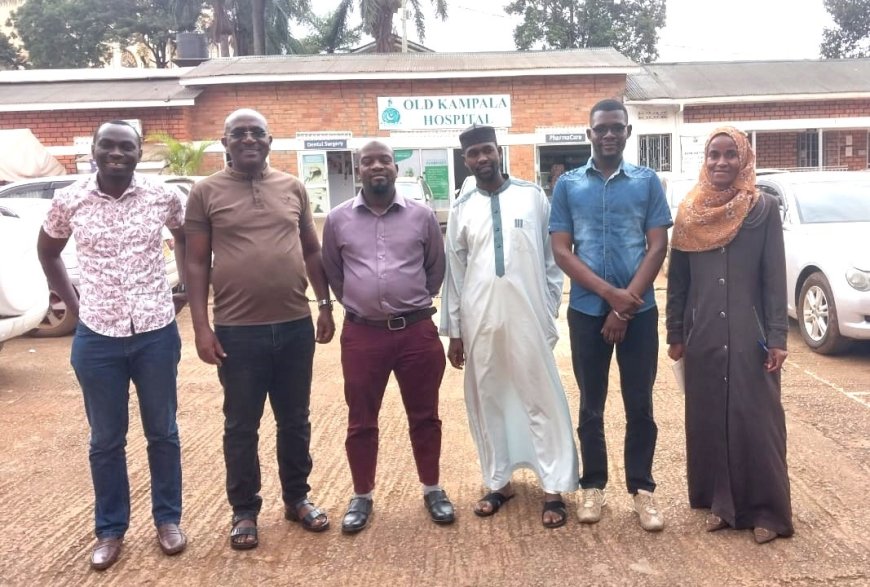Uganda Muslim Medical Bureau (UMMB) Hosts USAID SBCA for Consultative Dialogue with Religious Leaders
The meeting took place at the Old Kampala Hospital boardroom. The purpose of the gathering was to identify critical health promotion needs and strategize for a consultative dialogue between the Ministry of Health (MOH) and the Muslim Scholars and sheiks at the Uganda Muslim Supreme Council (UMSC). This was done in an effort to improve health promotion efforts within the Ugandan Muslim community.

In a significant initiative aimed at fostering community engagement and dialogue, the Uganda Muslim Medical Bureau (UMMB) recently hosted a Social and Behavior Change Activity (SBCA) sponsored by USAID. This event brought together religious leaders for a consultative dialogue, emphasizing collaboration and shared efforts towards addressing pressing social and health-related issues within the community.
The meeting took place last week at the Old Kampala Hospital boardroom. The purpose of the gathering was to identify critical health promotion needs and strategize for a consultative dialogue between the Ministry of Health (MOH) and the Muslim Scholars and sheiks at the Uganda Muslim Supreme Council (UMSC). This was done in an effort to improve health promotion efforts within the Ugandan Muslim community.
The USAID SBCA team presented comprehensive insights gleaned from their research and fieldwork, shedding light on the unique health promotion needs and preferences of the Muslim population. Emphasizing the importance of culturally sensitive approaches, the team underscored the significance of engaging religious leaders and community influencers in health promotion initiatives.
Throughout the deliberations, UMMB team identified priority areas for intervention, including Non Communicable diseases (NCDs) with focus on cancer, diabetes, hypertension and Mental Health, Gender based Violence (GBV) looking at adolescent health (early marriages) and substance abuse (mental health) and HIV prevention focusing on adolescent sexual & reproductive health, multiple sexual partners for married adults, nutrition, hygiene, and disease prevention. Recognizing the pivotal role of collaboration, participants explored opportunities for synergy between the Uganda Muslim Medical Bureau and the Ministry of Health to leverage resources and expertise effectively.
A key highlight of the meeting was the unanimous agreement to facilitate a consultative dialogue between the Ministry of Health and the Uganda Muslim Scholars and Sheiks for the adaptation and development of Risk Communication Supreme messages. This dialogue, envisioned as a collaborative platform for policymakers, health practitioners, religious leaders, and community members, aims to foster mutual understanding, share best practices, and co-create strategies to address health challenges holistically.
In a joint statement following the meeting, representatives from both parties expressed their unwavering commitment to advancing health promotion efforts within the Ugandan Muslim community. They emphasized the importance of inclusivity, cultural sensitivity, and evidence-based approaches in driving positive health outcomes and fostering community resilience. This meeting was attended by Baigereza Isaac Charles and Venansio Ahabwe from USAID SBCA, Kanyike Muhamad, Wabusimba Amiri, Sr Namakula Joweria and Dr Kizito Juma from UMMB. The discussions focused on planning the consultative dialogue to strengthen SBC engagements by Muslim religious leaders. Through sustained engagement, innovation, and partnership, they aim to pave the way for a healthier, more vibrant future for Uganda's Muslim population and the general public.
This engagement highlights the collaborative efforts between the USAID SBCA and the Uganda Muslim Medical Bureau to address health promotion needs within the Ugandan Muslim community, as plans for the consultative dialogue take shape, stakeholders remain optimistic about the transformative potential of collective action. Through sustained engagement, innovation, and partnership, they aim to empower the Ugandan Muslim community to lead healthier, more vibrant lives. This comprehensive narrative captures the essence of the collaborative efforts between the USAID SBCA team and the Uganda Muslim Medical Bureau to address health promotion needs within the Ugandan Muslim community.
What's Your Reaction?

















































































